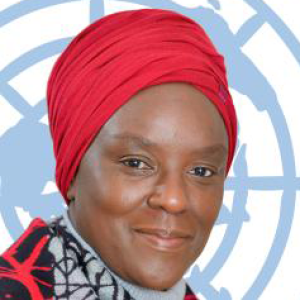World AIDS Day Commemoration 2022
Speech by the UN Resident Coordinator on the occasion of the commemoration of World AIDS Day 2022
Let Me Start by Paying My Respects to
His Majesty King Letsie III,
The Right Honorable Prime Minister, Mr. Ntsokoane Samuel Matekane,
Honorable President of Senate,
Honorable Speaker of The National Assembly,
His Lordship The Chief Justice,
His Lordship President of The Court of Appeal,
Honorable Deputy Prime Minister,
Honorable Members of His Majesty’s Cabinet,
Their Lordships Judges of The High Court,
Chairperson of the National AIDS Commission and all NAC Commissioners
Honorable Members of Parliament,
Members of The Diplomatic Corps and international Organizations,
Representatives of CSOs and Media Houses,
All people living with and affected by HIV
Distinguished Guests, Ladies and Gentlemen
On this important occasion as we commemorate World AIDS Day, I have the honor and privilege to make a few remarks on behalf of the United Nations Family in Lesotho.
World AIDS Day is an opportunity for people around the world to unite in the fight against HIV, to show solidarity with people living with HIV, and to commemorate those who have died from AIDS-related illnesses.
On this day, we also celebrate the progress made in the fight against HIV, where in the face of global crises we experienced the last three years with the COVID-19 pandemic—along with economic and humanitarian crises, several parts of the world and communities showed remarkable resilience in their responses to HIV. In 2021, 28.7 million people living with HIV (75% of the global total) received antiretroviral therapy. This is in stark contrast to only 7.8 million people receiving antiretroviral therapy in 2010.
The situation in Lesotho is also commendable, where 87% of all adults living with HIV received antiretroviral therapy, and 80% of all adults living with HIV were virally suppressed in 2020. This is significant progress: we know that at the peak of the AIDS pandemic, we were losing over 15,000 adults a year due to AIDS-related illnesses.
According to UNAIDS, these deaths have declined to just over 4,000 in 2021. Reducing AIDS-related deaths through an aggressive expansion of HIV testing and antiretroviral therapy is one of the biggest successes of the global HIV response: This is also contributing to reducing the transmission of HIV.
This progress, ladies and gentlemen is, however, uneven and fragile. A new UNAIDS Report released a few days ago, shows that inequalities are blocking the end of the AIDS pandemic. The report, entitled ‘Dangerous Inequalities’, shows that gender inequalities, inequalities faced by key populations, inequalities between children and adults and the worsening financial constraints are holding back the end of the AIDS pandemic.
The effects of gender inequalities on women’s HIV risks are especially pronounced in our sub Saharan Africa region: Women accounted for 63% of new HIV infections in 2021. Adolescent girls and young women (aged 15 to 24 years) are three times more likely to acquire HIV than adolescent boys and young men of the same age group. We need to interrupt the power dynamics and strengthen policies that will reduce girls’ vulnerability to HIV - including disrupting the normalization of gender-based violence.
In Lesotho, most women and girls have experienced some form of gender-based violence including intimate partner violence, femicide, rape and trafficking which also involves children. This gender-based violence puts women and girls at an increased risk of HIV and prevents them from accessing the much-needed HIV prevention, treatment, care and support services.
As part of the 16 Days of Activism against Gender-Based Violence, we are saying “UNITE! Activism to end violence against women and girls”.
Harmful masculinities also discourage men from seeking HIV services. Globally, 80% of women living with HIV were accessing treatment in 2021, compared to only 70% of men. In Lesotho the differences are also marked with 90% of women living with HIV accessing treatment compared to 84% men. We need to strengthen and increase gender- transformative programmes including advancing gender equality. This will not only benefit HIV but many of our development priorities as articulated in the National Strategic Development Plan.
The new UNAIDS report goes further to show that the AIDS response is being held back by inequalities in access to treatment between adults and children. While over three quarters of adults living with HIV are on antiretroviral therapy, just over half of children living with HIV are on this lifesaving medicine. It is unacceptable ladies and gentlemen, that with the widely available, affordable, and effective treatment for children, we still have nearly 1,000 children dying due to HIV each year in Lesotho 2021. We need to overcome these disparities in access to treatment and ultimately end AIDS in children by 2030. No child living with HIV should be denied treatment and we should eliminate new HIV infections in children.
While we have also seen progress in HIV prevention in Lesotho,the fight to interrupt new HIV infections is far from over. The youth and in particular adolescent girls and young women aged (aged 15 - 24) continue to register a prevalence rate of 11.1% compared to 3.4% in males of the same age group. We also see high HIV prevalence in key populations, for example one in every two sex workers living with HIV. Discrimination against, stigmatization and criminalization of key populations are costing lives and preventing the world from achieving agreed AIDS targets.
We only have eight years left before the 2030 Goal of Ending AIDS as a global health threat. Economic, social, cultural, and legal inequalities must be addressed as a matter of urgency. Inequalities which perpetuate the AIDS pandemic are not inevitable; we can tackle them. This World AIDS Day, I want to urge each of us to address the inequalities which are holding back progress in ending AIDS.
Speech by




